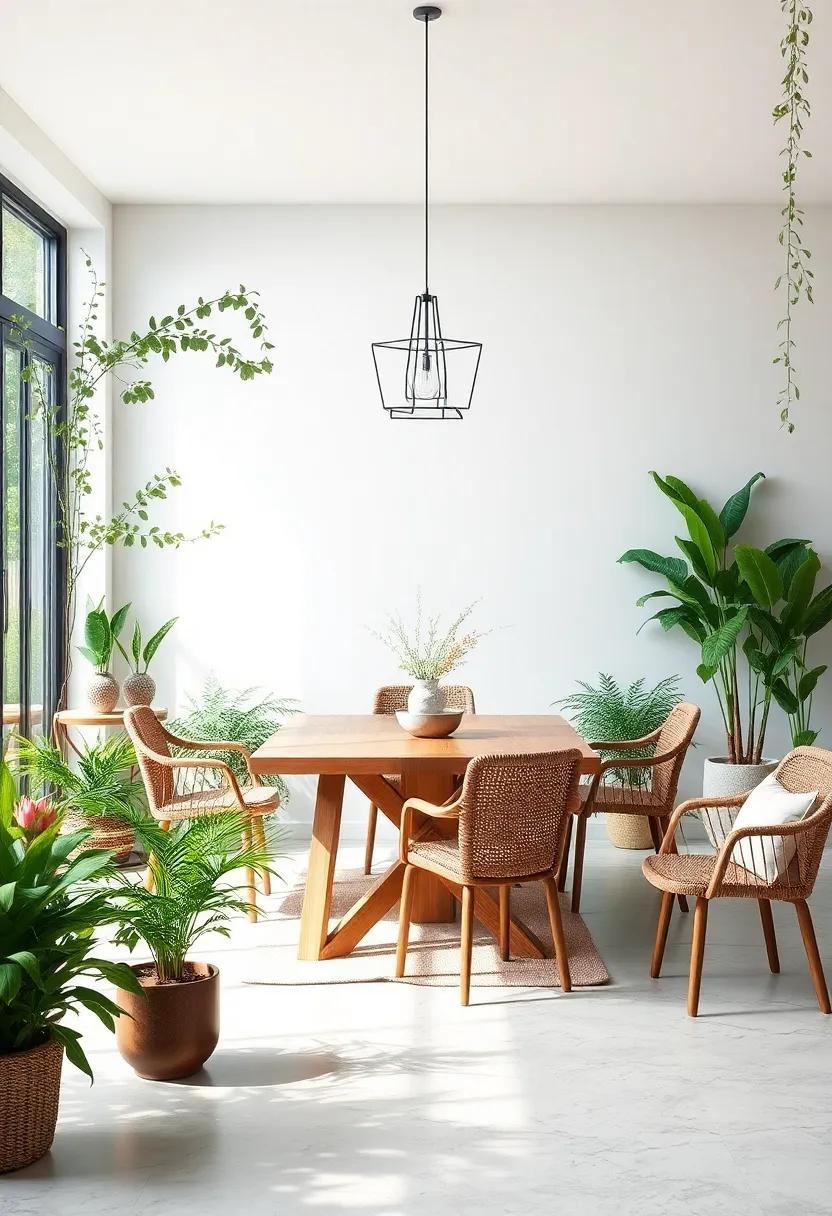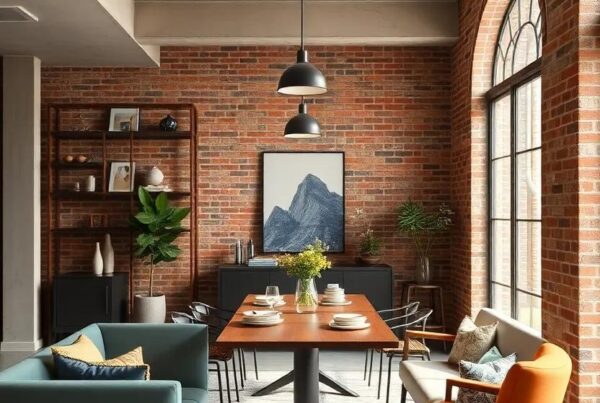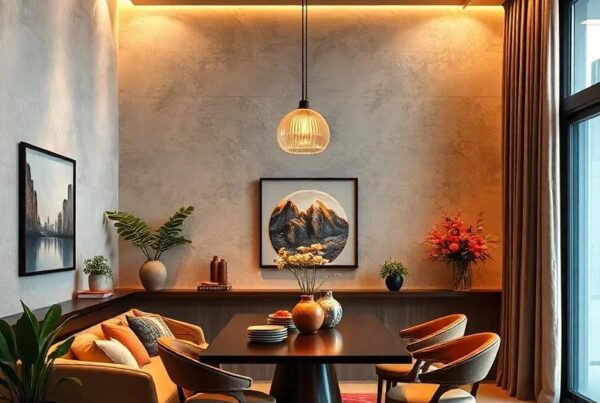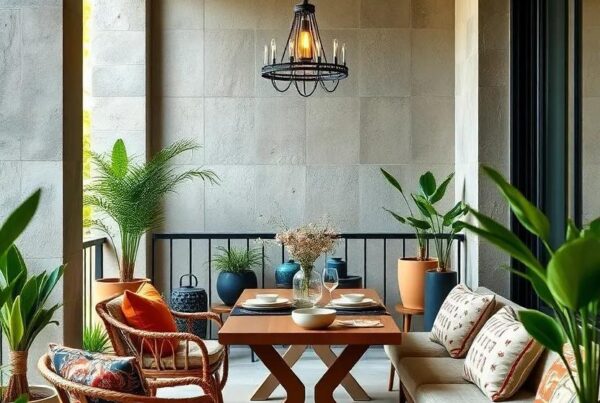In an age where the hustle adn bustle of everyday life often takes precedence, creating a sanctuary within our homes has never been more essential. Imagine stepping into your dining room and feeling an immediate sense of tranquility, as if you’ve just crossed the threshold into a serene garden retreat. The gentle rustle of leaves, the vibrant colors of blossoms, and the earthy aromas of nature all converge to create an oasis that invigorates the soul while nourishing the body. In this article, we delve into the delightful fusion of indoor dining and nature, offering inspiration and practical tips on how to transform your dining area into a lush, botanical haven. Whether you have a green thumb or simply wish to incorporate a dash of the outdoors into your décor, discover how embracing nature can enhance your dining experience and foster a deeper connection with the environment around you.
Embracing the Outdoors with Lush Green Table Centerpieces
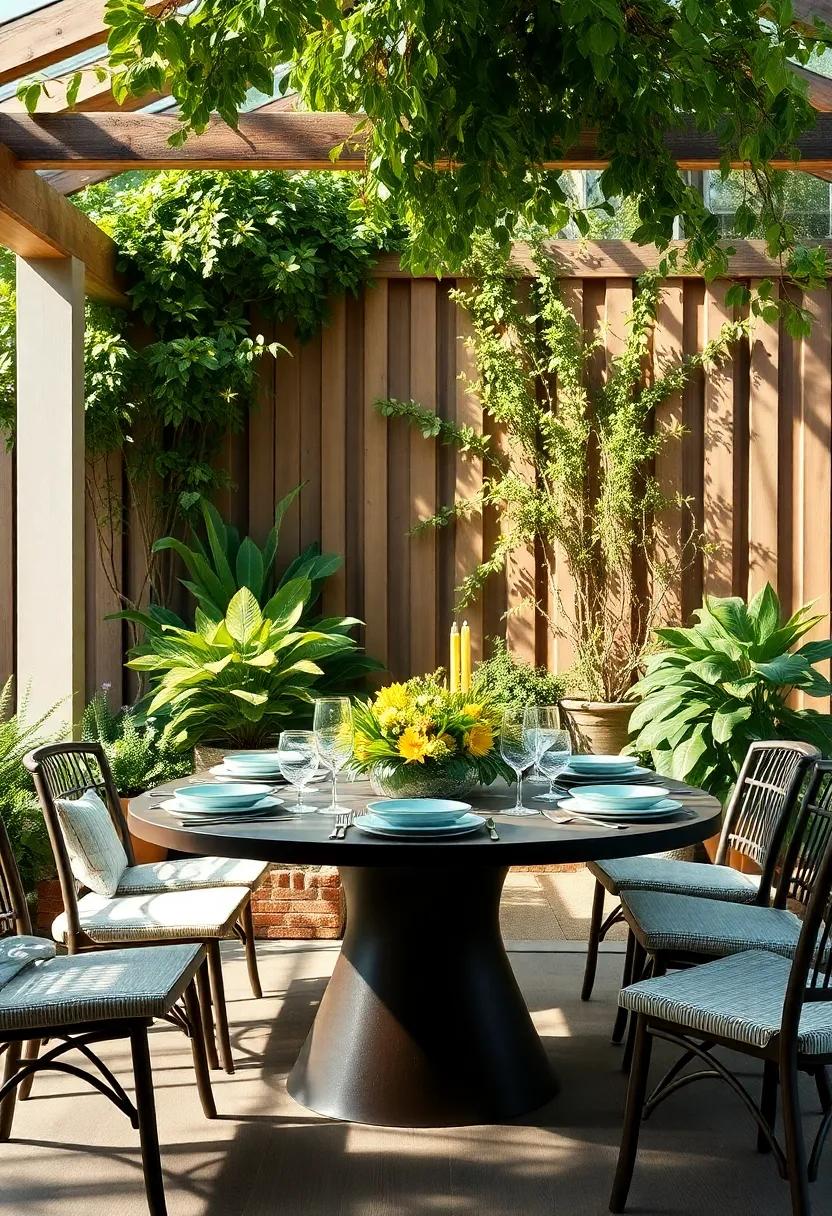
There’s something magical about bringing a piece of nature indoors, especially when it comes to dining experiences. Incorporating lush green table centerpieces instantly infuses a sense of tranquility and freshness into your space. Consider using a variety of plants such as ferns,succulents,and potted herbs to create an inviting focal point. These options not onyl enhance the aesthetic appeal but also add a sensory layer to your meals with their delightful fragrances. To create a harmonious arrangement, strive for a balance of heights and textures, ensuring that each component complements the others.
When it comes to designing your centerpiece, think beyond the conventional vase. Utilize natural materials such as wooden bowls, stone containers, or even hanging installations to evoke a rustic feel. Here are some ideas to elevate your table setting:
- Use terrariums filled with small, low-maintenance plants for a modern touch.
- Mix natural elements like moss or stones to create an earthy base.
- Incorporate seasonal blooms that reflect the changing environment.
In addition, you might consider grouping smaller pots together to create layers of greenery, drawing the eye across the table and inviting guests to engage with the arrangement. This interplay of plants will transform your dining area into a serene garden retreat, making every meal a delightful occasion.
Creating a Cozy Atmosphere with Natural Textiles and Colors
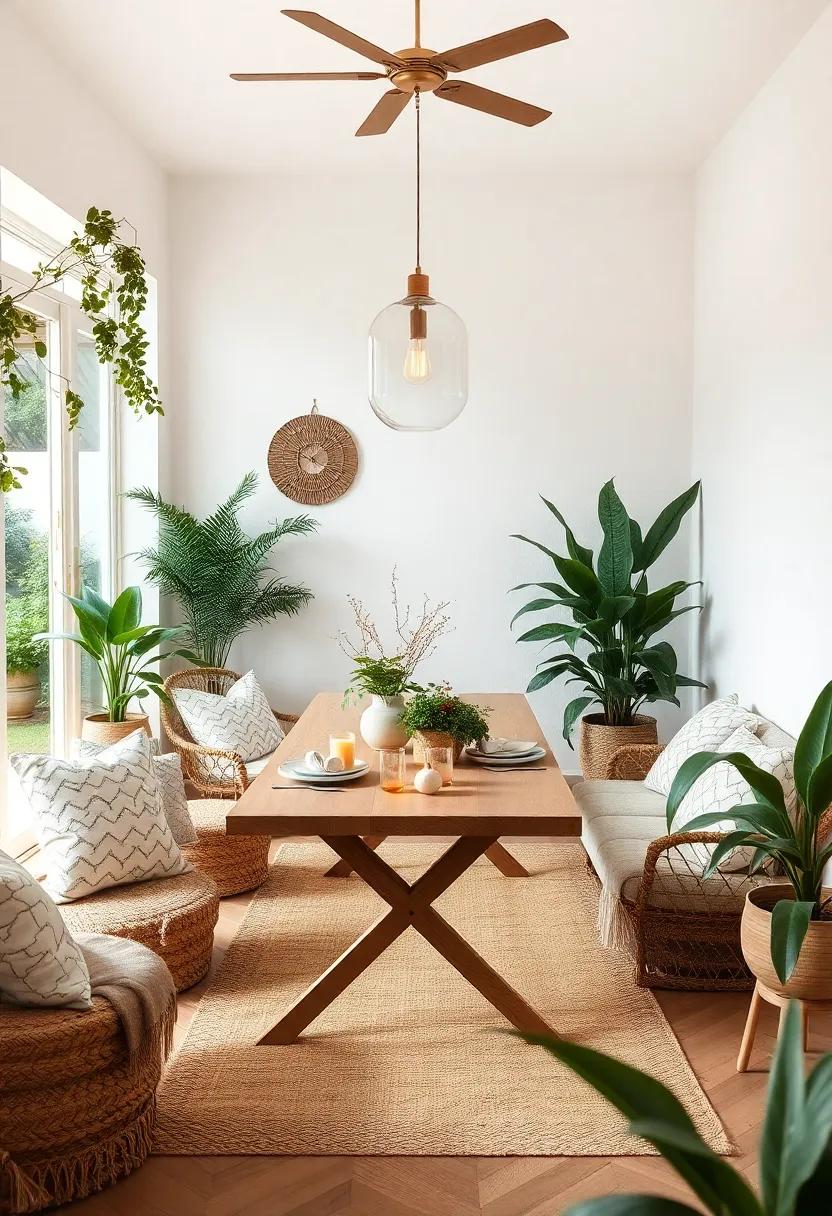
To truly evoke the essence of nature within your dining room, consider incorporating natural textiles like linen, cotton, and wool. These materials not only add warmth but also create a tactile experience that enhances the overall ambiance.Opt for table linens that feature earthy tones such as moss green, sandy beige, and warm terracotta to mirror the colors found in a lush garden. Layering these textures on your dining table can also set a welcoming tone. Think about adding woven placemats and a soft table runner that highlights the organic theme, offering depth and comfort without overwhelming the senses.
In addition to fabrics, implement a color palette that reflects the beauty of the outdoors.Soft shades of sage green, sky blue, and sunset orange can create an inviting space that resonates with tranquility and peace. Incorporate these colors through your wall paint, dining chairs, or decorative pieces like cushions and artwork. To further enhance this theme, consider a centerpiece that showcases natural elements, such as a simple wooden bowl filled with seasonal fruits or a glass vase adorned with freshly cut wildflowers. Each element should harmoniously blend to create a serene retreat where nature comes alive within your dining area.
Introducing Indoor Plants for Freshness and Serenity
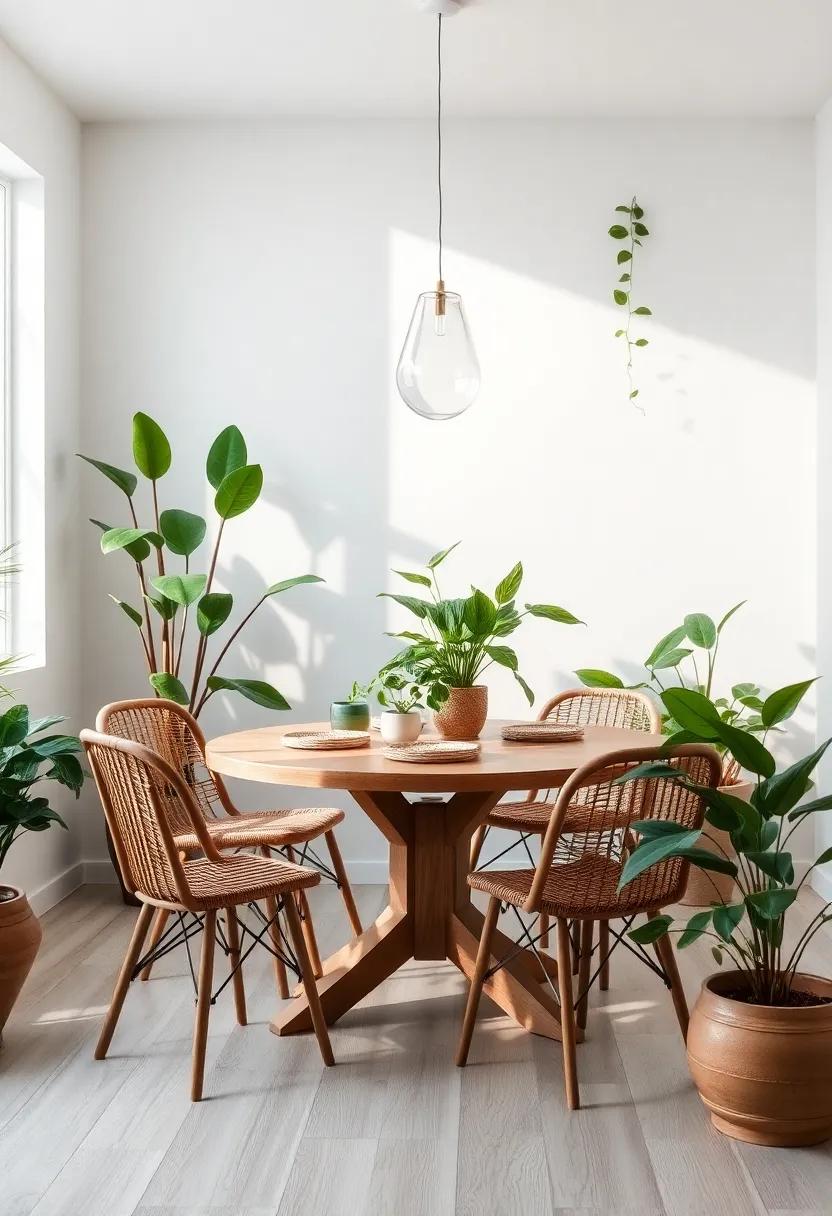
Bringing the outdoors inside can effortlessly uplift your dining room, turning it into a soothing oasis of green. Select plants that thrive in indoor environments to enhance the overall ambiance while maintaining the freshness you crave. Here are some options to consider:
- Peace lily – Known for its air-purifying qualities and elegant white blooms, it also thrives in low light.
- Snake Plant – A hardy plant that tolerates neglect and produces oxygen, making it ideal for busy lifestyles.
- Spider Plant - With its playful arching leaves and resilience, it adds a touch of cheer to any space.
- Fiddle Leaf Fig – Its large leaves are perfect for making a bold statement in your dining room.
To maximize the benefits of your indoor garden, consider creating layers and varying heights among your plants.Use stylish plant stands or decorative pots, and arrange your greenery on shelves or tabletops to create visual interest. Here’s a simple table to help you visualize your options:
| Plant | Light Requirement | Watering Frequency |
|---|---|---|
| Peace Lily | Low to Radiant Indirect | Weekly |
| Snake Plant | Indirect Light | Every 2-3 weeks |
| Spider Plant | Bright Indirect Light | Weekly |
| Fiddle Leaf Fig | bright Indirect Light | Weekly |
By integrating these vibrant plants into your dining space, you will not only breathe new life into the decor but also enhance your overall well-being. The gentle presence of greenery invites a sense of calm and encourages more mindful dining experiences. Create your personal garden retreat and enjoy the bountiful benefits of tranquility right at the heart of your home.
Incorporating Nature-Inspired Art and Sculptures
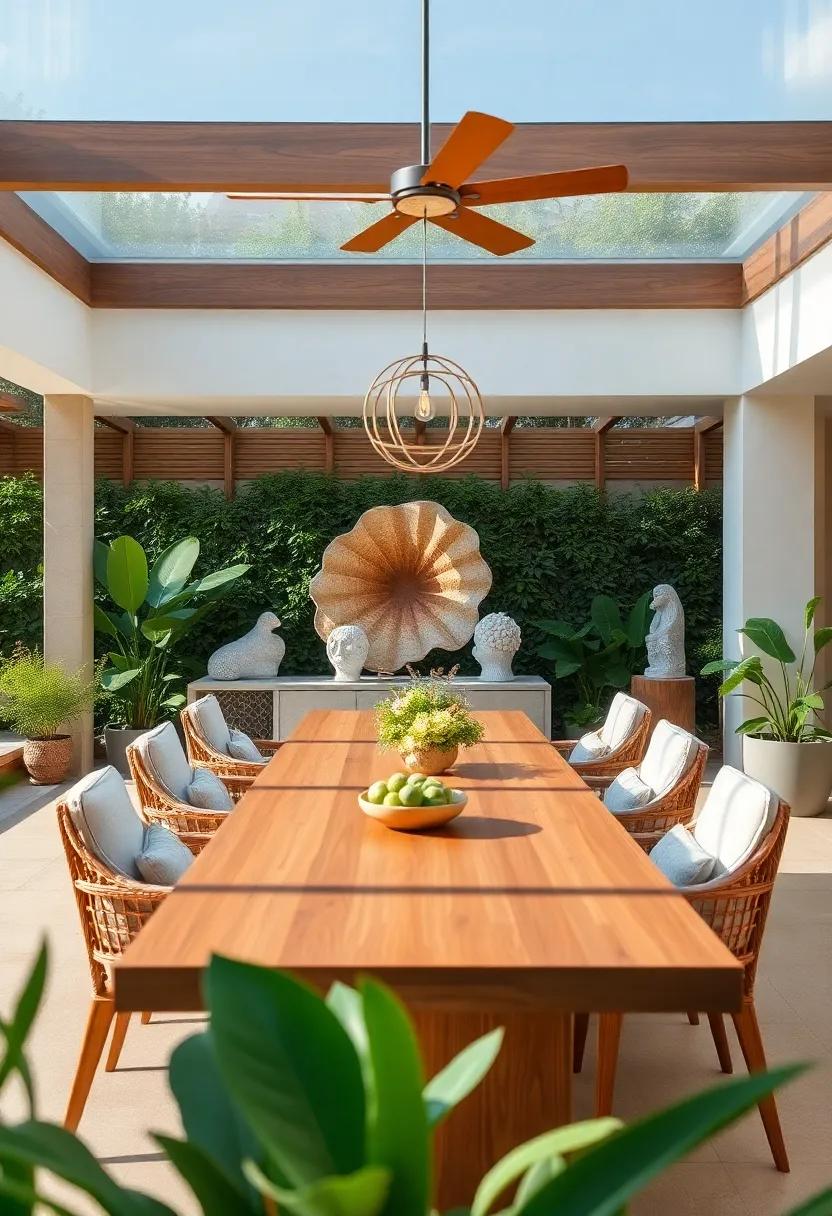
Elevate the ambiance of your dining room by introducing a selection of nature-inspired art and sculptures that breathe life into your space. Consider incorporating pieces that reflect the beauty of the natural world, such as vibrant botanical prints or handcrafted wooden sculptures that evoke the essence of organic forms. These artistic elements not only create a harmonious balance with your décor but also foster a sense of calm and connection to the great outdoors.
To fully embrace this theme, curate a collection of decorative accents that resonate with your love for nature. Here are some ideas to help you get started:
- Wall Art: Choose large-scale landscapes or floral artwork to serve as captivating focal points.
- Table Centerpieces: Feature sculptures made from stone or clay that reflect natural elements like mountains or water.
- Natural Materials: Incorporate pieces made from reclaimed wood, bamboo, or stone for an eco-kind touch.
Consider using a
| Element | Suggested Material | Impact |
|---|---|---|
| Wall art | Canvas, Metal Prints | Creates a striking focal point |
| Table Accents | Glass, Wood | Adds texture and depth |
| Sculptures | Stone, Clay | evokes serenity and balance |
to organize your selections, ensuring your dining area becomes a true haven of tranquility and beauty.
Designing a Light-filled Space with Large Windows and Mirrors
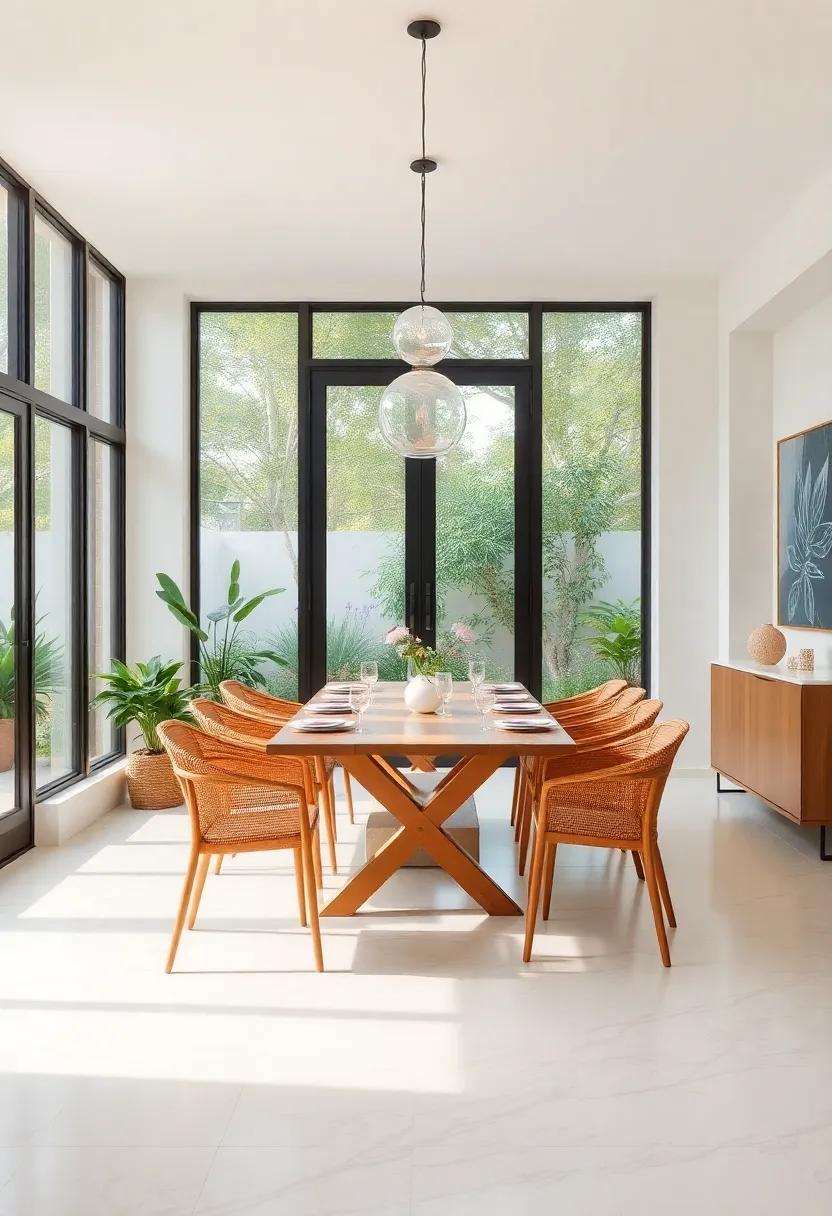
To create a serene oasis in your dining room, consider the transformative power of large windows that invite the beauty of the outdoors in. By replacing solid walls with expansive glass panels,you allow natural light to flood the space while offering breathtaking views of your garden or surrounding landscape. This design choice not only enhances the overall atmosphere but also fosters a connection with nature, making each meal feel like an experience rather than just a routine. Consider framing your windows with lush greenery, such as climbing vines or window boxes, to harmonize indoor and outdoor elements.
mirrors play a pivotal role in amplifying the luminosity and spaciousness of your garden retreat. strategically placing large mirrors across from windows or near light sources can create an illusion of depth and bounce light around the room, making even smaller spaces feel more expansive. When selecting mirrors, opt for those with ornate frames that resonate with your garden theme, or go for sleek, modern designs for a minimalist look. To further enhance the ambiance, consider incorporating a variety of textures:
- Glass tableware to reflect light.
- Soft textiles like linen or cotton.
- Natural materials such as wood or stone.
Using Earthy Tones to Connect with the Natural World
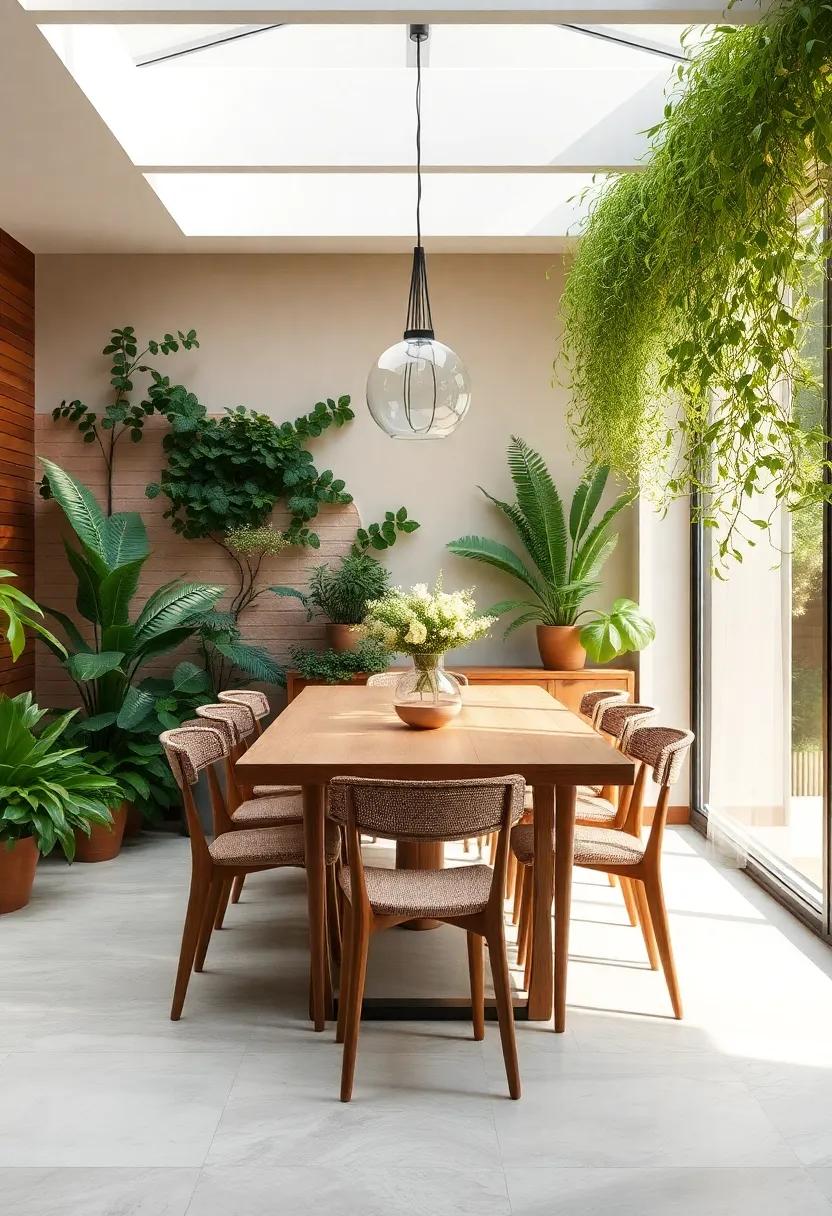
To create a harmonious space that evokes the serenity of nature, start by incorporating earthy tones into your dining room design. Shades such as soft greens,muted browns,and gentle terracottas can help establish a warm,inviting atmosphere. These colors not only promote a sense of calm but also serve as a subtle backdrop for natural elements like wood, stone, and plants.Consider selecting a neutral palette for your walls and larger furniture pieces, allowing colorful accents—through linens, art, or decorative items—to bring in the vibrancy of the outdoors.
Integrate organic materials and textures to enhance the connection to the natural world. Layering different fabrics like linen and wool in earthy hues can create a cozy, tactile environment. Include a variety of indoor plants in your dining area, opting for greens that resonate with your overall color scheme. Accentuate the look with a centerpiece crafted from natural elements such as driftwood or a terrarium, which will draw the eye and foster a sense of tranquility at your dining table. Below is a quick reference for creating a cohesive earthy tone palette:
| Color | Hex Code | Complementary Element |
|---|---|---|
| Soft Sage | #A8B5A1 | Plants |
| Muted Brown | #7B5B3A | Wood Furniture |
| Terracotta | #D97F4C | Clay Pots |
Crafting a Vertical Garden Wall for Added Visual Interest
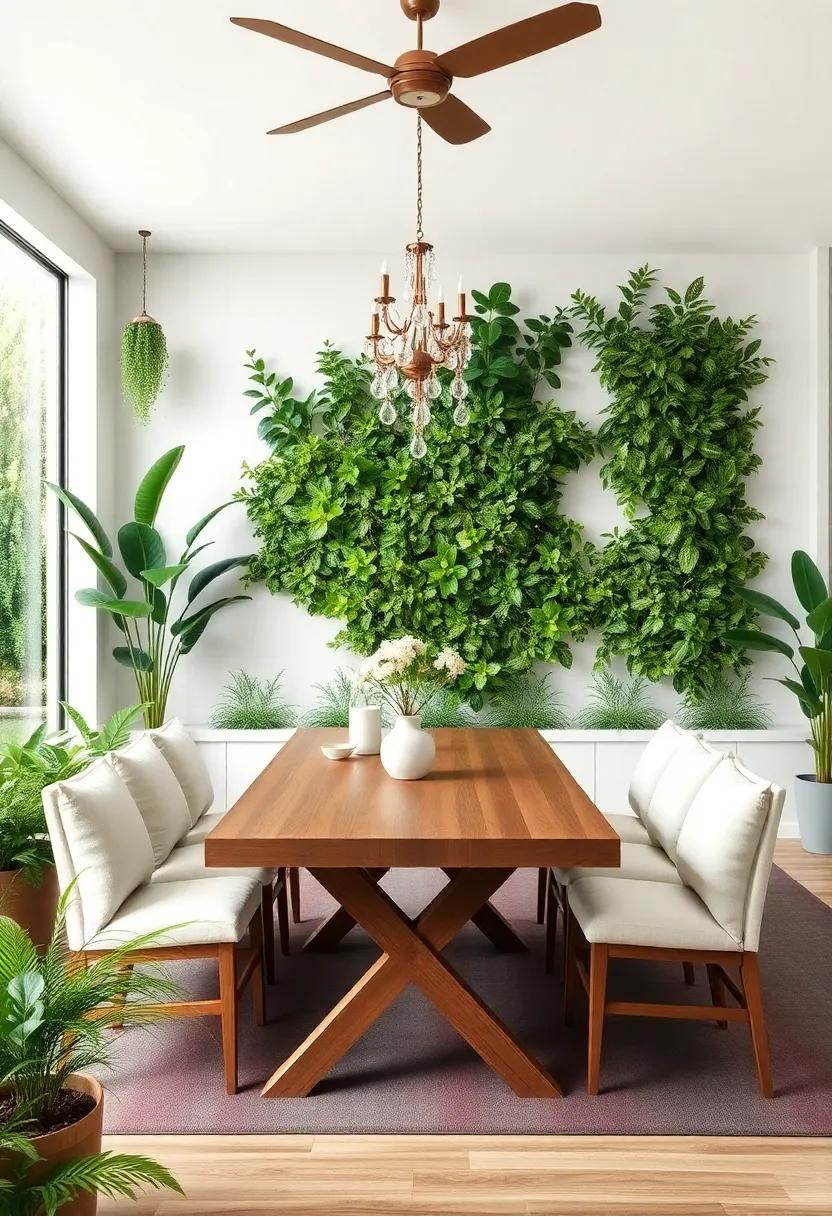
Transforming a plain wall into a stunning vertical garden creates an invigorating focal point in your dining room. To get started, consider using a variety of planters and pots that can hold different types of plants. Installing wall-mounted shelves or a trellis will provide the structure necessary to display your botanical treasures. A mix of leafy greens, vibrant flowers, and textured succulents can bring depth and personality to your space. To maintain visual harmony, choose plants with complementary colors and shapes. Here are some popular plant choices for your vertical garden:
- Ferns: Add a touch of elegance with their lush, feathery fronds.
- Herbs: Not only do they smell splendid, but they’re also useful in the kitchen.
- Succulents: Easy to care for and perfect for a modern aesthetic.
- Vines: Create a cascading effect with plants like pothos or string of pearls.
Once you’ve selected your plants, think about the lighting and irrigation needs. Position the garden wall where it can receive natural sunlight or use grow lights to stimulate growth, especially in darker spaces. incorporating a self-watering system can help alleviate the maintenance burden, ensuring your plants remain hydrated without constant attention. To add a unique touch, consider layering different heights and textures within your vertical garden to create a lush, multi-dimensional experience. Organizing plants in a visually appealing pattern not only enhances aesthetics but also promotes better airflow and sunlight exposure.
| Plant Type | Light Requirement | Watering Needs |
|---|---|---|
| Ferns | Indirect sunlight | Moderate |
| Herbs | Full sunlight | Regular |
| Succulents | Bright, indirect | Low |
| Vines | Bright light | Water when dry |
Harmonizing natural Wood Elements into Your Dining Decor
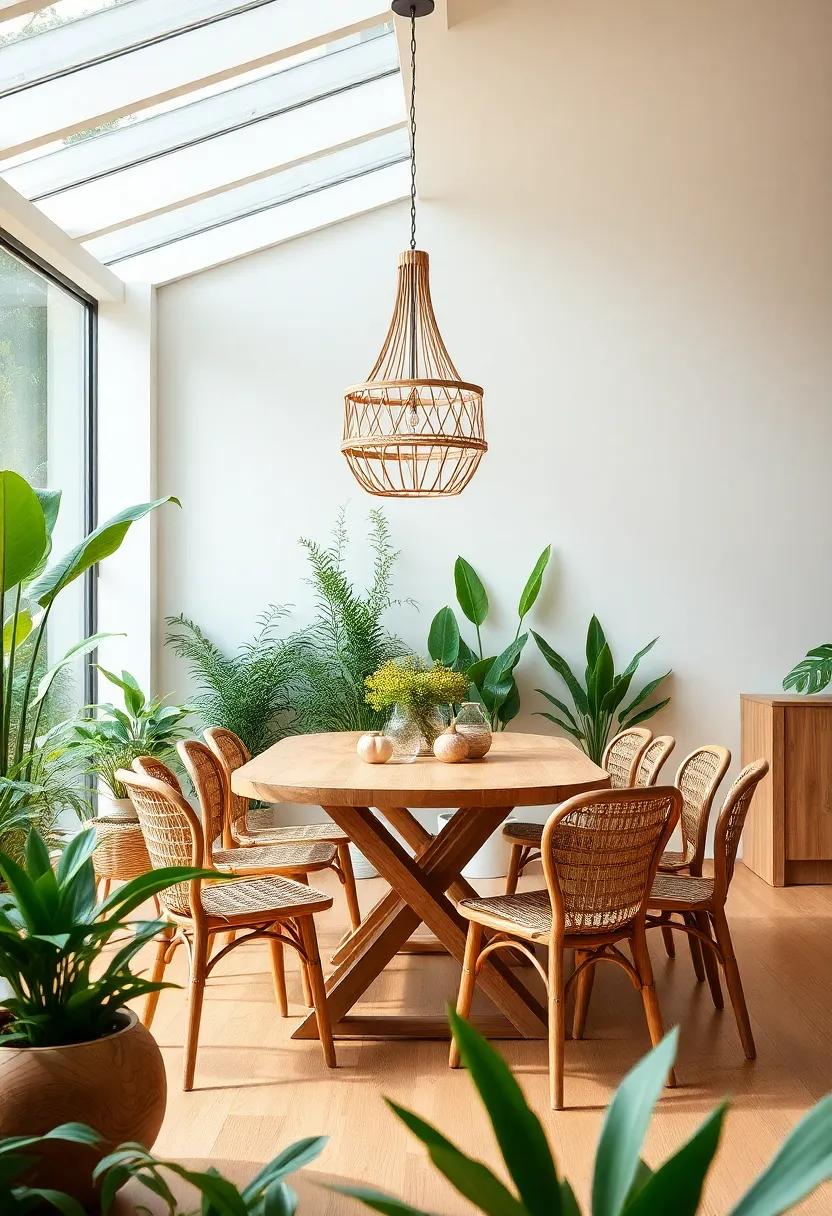
Integrating natural wood elements into your dining decor can instantly elevate the ambience, creating a warm and inviting atmosphere reminiscent of a tranquil garden retreat. Consider using furniture crafted from reclaimed wood, which not only adds rustic charm but also tells a story with its unique grain and texture. You can further enhance this theme with accessories such as:
- Wooden serving trays for an effortless sophistication during meals
- Handcrafted coasters that reflect the beauty of nature
- Raw wood centerpieces,adorned with seasonal blooms
For a cohesive look,pair your wooden elements with complementary soft textiles and earthy tones. Opt for table linens in shades of deep green and soft beige, reminiscent of garden foliage. To complete the look, incorporate greenery through potted plants or fresh herbs; they not only purify the air but also enhance the visual connection to the outdoors. Here’s a simple table illustrating ways to blend wood and greens:
| Element | Purpose | Example |
|---|---|---|
| Wooden Table | Creates a natural foundation | Reclaimed oak dining table |
| Wooden Chairs | Enhances seating comfort | Farmhouse-style wooden chairs |
| Potted Herbs | Adds freshness and fragrance | Basil or rosemary on the table |
Setting the Table with Rustic Dinnerware and Utensils
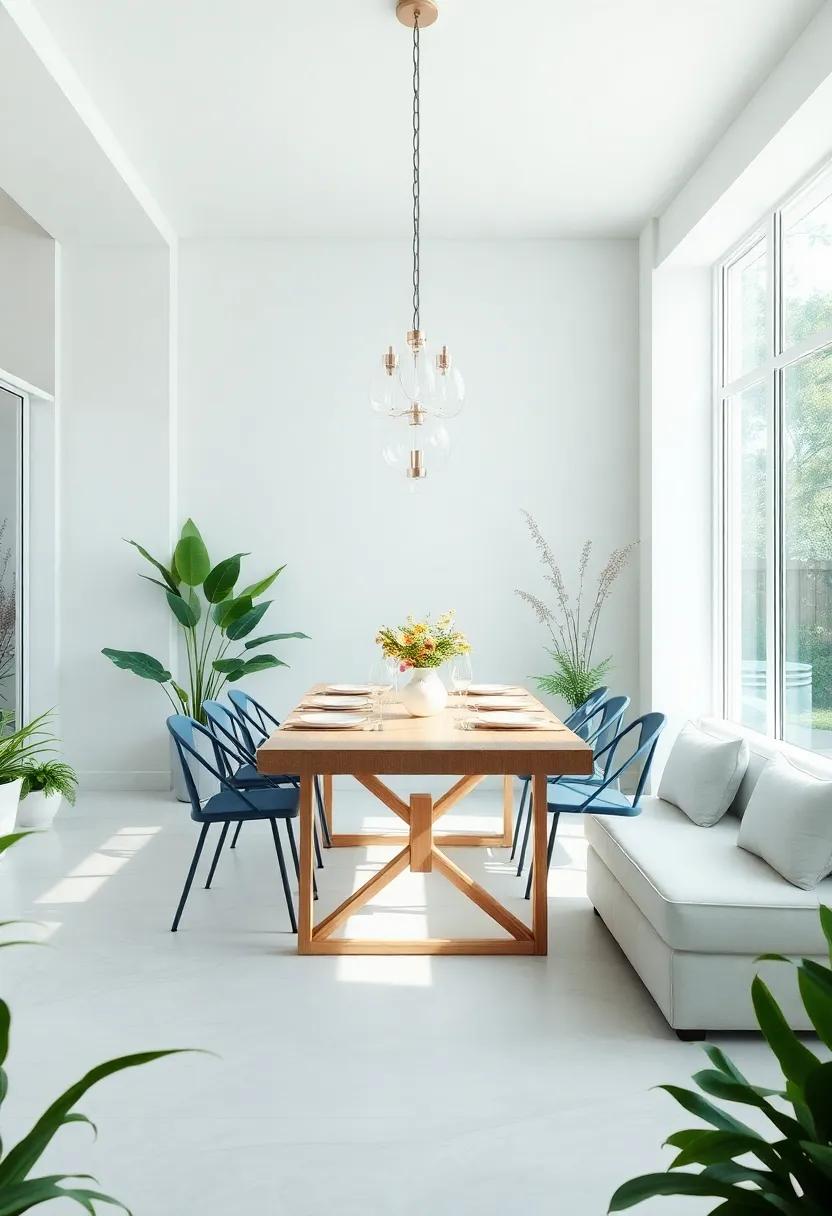
To create that enchanting garden retreat feel in your dining room, consider using rustic dinnerware and utensils that celebrate the charm of nature. Earthy tones, textured surfaces, and handcrafted designs can transform an ordinary table into a captivating centerpiece. Opt for:
- Hand-thrown pottery: Unique pieces with organic shapes add character and warmth.
- Wooden serving platters: Their natural grains and colors evoke a sense of the outdoors.
- Textured linen napkins: Bring an artisanal touch to your table setting.
- Glass tumblers: Choose ones with an imperfect finish to mirror nature’s beauty.
Equally crucial are the utensils you select. Forged metal utensils with a rustic finish not only offer functionality but also enhance the aesthetic appeal of your dining experience. Consider a mix of:
- Handcrafted wooden spoons: Their warmth enhances the natural vibe.
- Wrought iron forks and knives: Durable yet elegant, they seamlessly blend with garden-themed decor.
- Bamboo serving tools: Eco-friendly and stylish, they resonate with the ethos of sustainability.
Integrating Seasonal Flowers for Ever-Changing Beauty
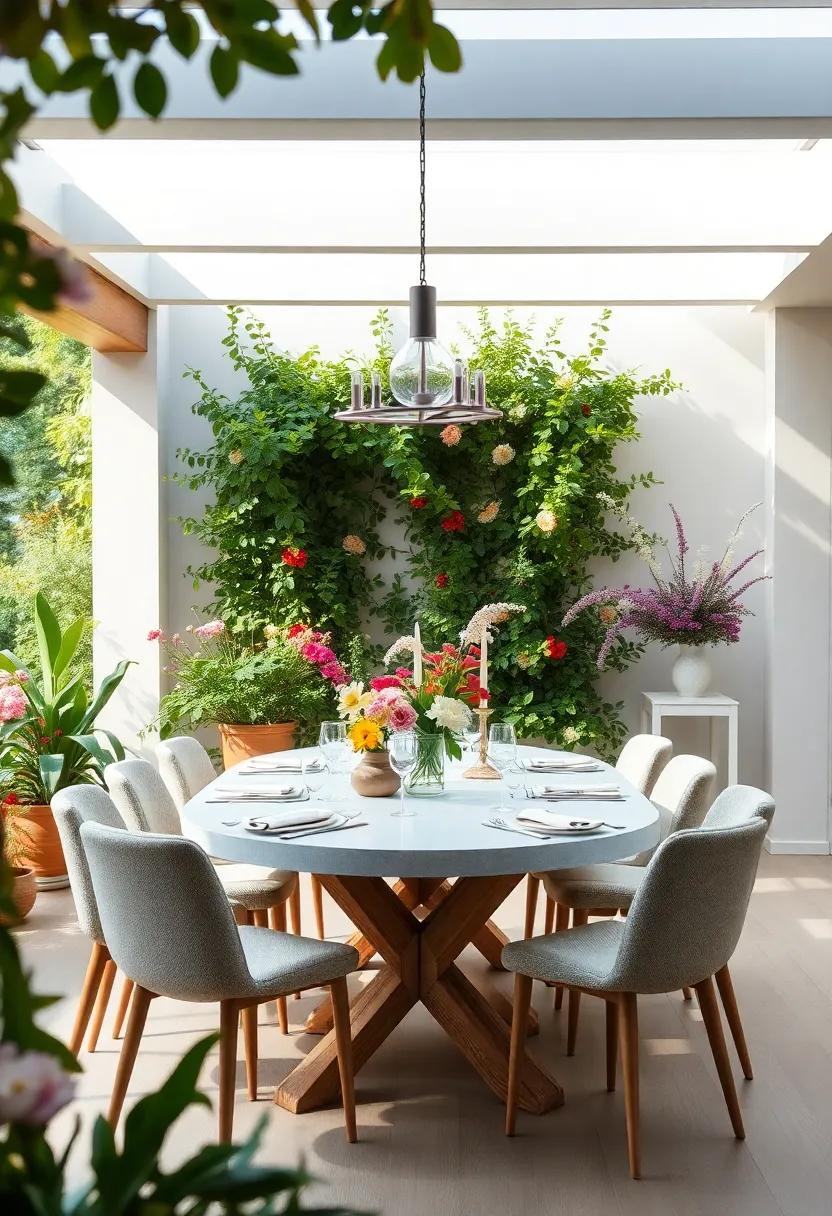
One of the most delightful aspects of decorating your dining room is the ability to incorporate seasonal flowers, creating a vibrant focal point that evolves throughout the year. Using a variety of blooms not only enhances the aesthetic of the space but also brings in different scents and textures that can uplift the mood of every gathering. Consider selecting flowers such as:
- spring: Tulips and daffodils for a fresh, cheerful ambiance.
- Summer: Sunflowers and hydrangeas to add warmth and richness.
- Autumn: Chrysanthemums and marigolds for earthy tones.
- Winter: Poinsettias and amaryllis to bring warmth during the colder months.
Arranging these seasonal florals can be a fun and creative outlet, allowing you to experiment with vibrant color combinations and stylish containers. Consider using glass vases, vintage jars, or even hand-painted pots that reflect your unique personality and complement your dining room decor. To inspire your creativity, here’s a simple table showcasing some popular flower pairings:
| Season | Flower Pairings | Container Ideas |
|---|---|---|
| Spring | Tulips + Daffodils | Clear glass vase |
| Summer | Sunflowers + Hydrangeas | Rustic wooden box |
| Autumn | Chrysanthemums + Marigolds | Clay pot |
| Winter | Poinsettias + Amaryllis | Decorative tin bucket |
Utilizing Ambient Lighting to Mimic Natural Sunlight
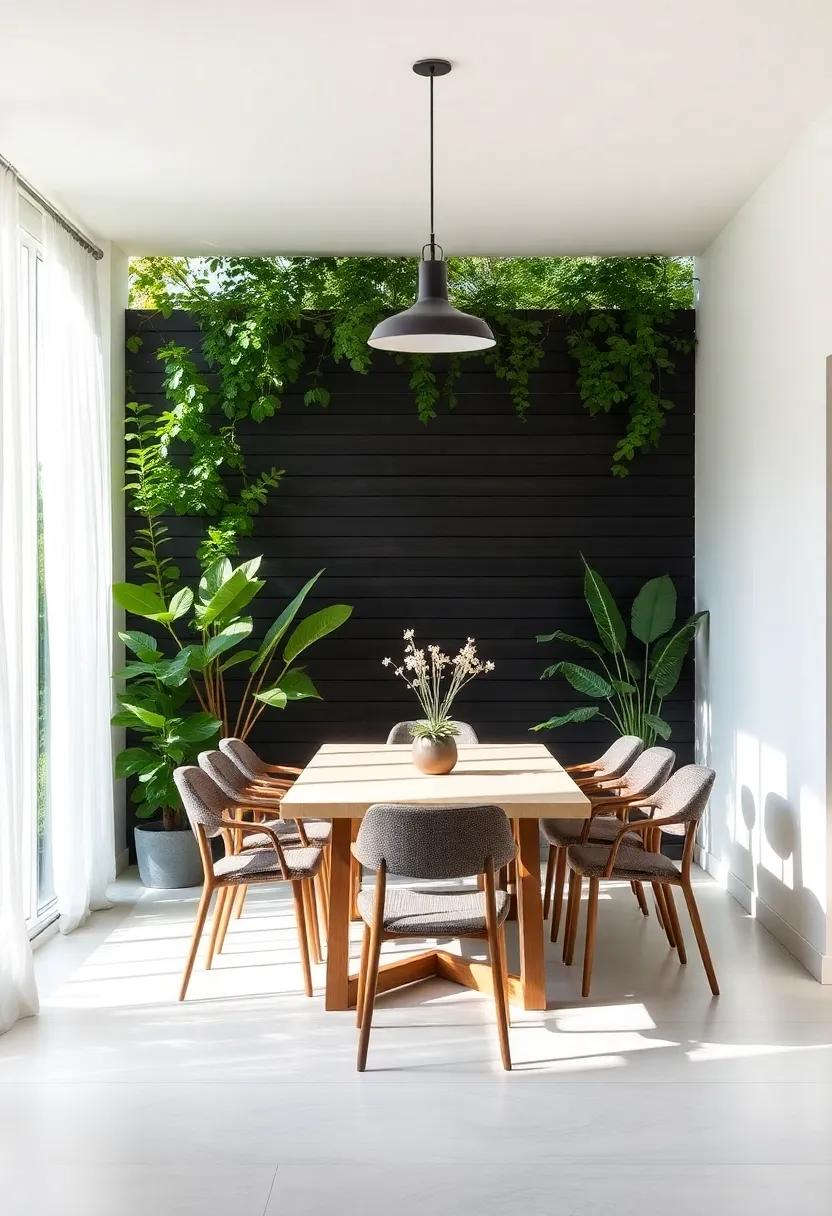
Ambient lighting can transform your dining room into a serene escape reminiscent of a sun-drenched garden. By strategically positioning light sources,you can cast a soft glow that mimics the tranquil brightness of natural sunlight. Consider using:
- Warm-toned LEAD bulbs: they replicate the golden hues of sunlight, creating a cozy atmosphere.
- Dimmers: These allow you to adjust brightness, simulating the gradual changes in daylight throughout the day.
- Floor and table lamps: Placing these near plants can enhance their colors and textures, further emphasizing the lush garden feel.
To elevate the effect,think about incorporating reflective surfaces that can amplify the light,such as mirrors or glass decor.Another innovative method is to use a sunrise alarm clock as a light feature,gradually increasing brightness. For a more cohesive look, consider creating a lighting plan that includes:
| Lighting Type | Effect |
|---|---|
| Overhead Pendant Lights | Creates an inviting focal point |
| Wall Sconces | Softly illuminates dark corners, mimicking sunlight filtering through trees |
| Strip Lighting | Accentuates architectural features, adding depth |
Selecting Sustainable Furnishings for an Eco-friendly Feel
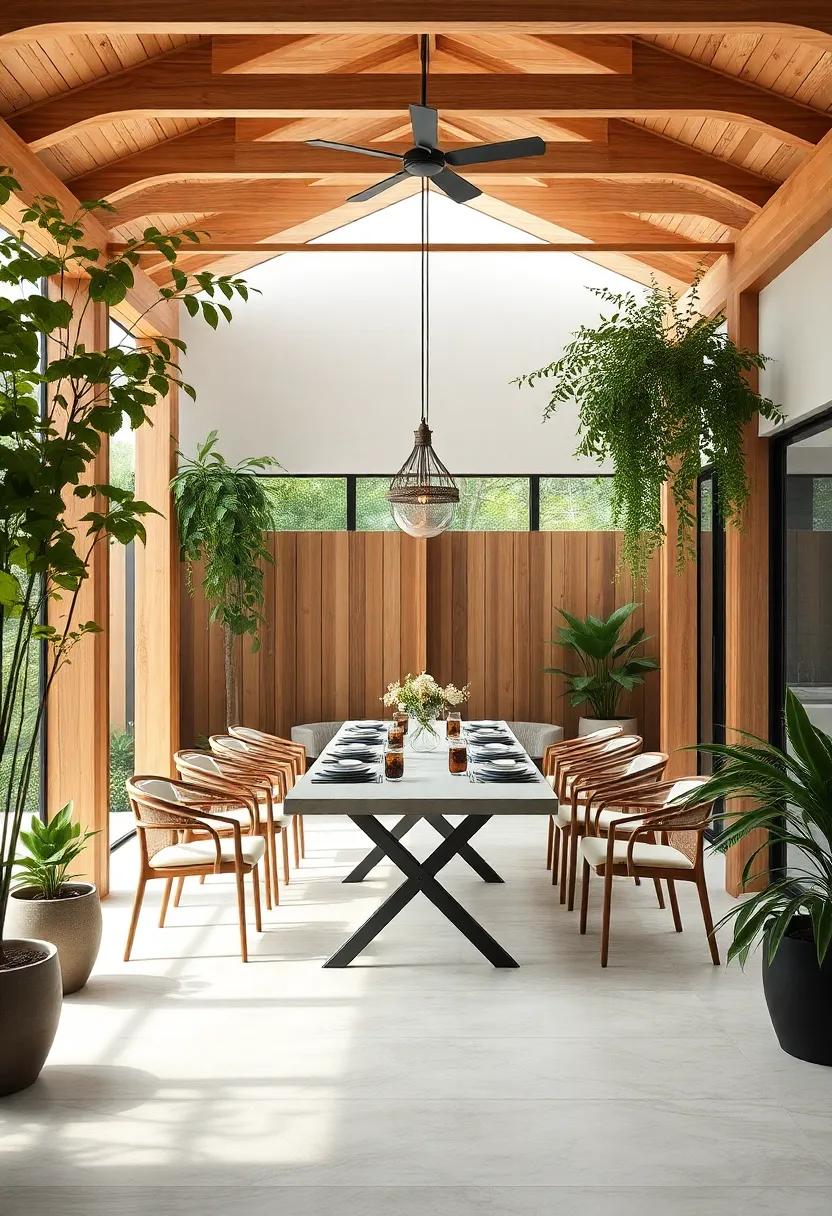
When curating an eco-friendly dining room, your choice of furnishings plays a crucial role in embodying the spirit of nature while ensuring sustainability. Opt for wood sourced from certified forests, such as those certified by the Forest Stewardship council (FSC), as it assures responsible forest management. Similarly, consider selections crafted from reclaimed materials, which not only prevent waste but add a unique story to each piece. For upholstery, look for fabrics made from organic cotton, hemp, or bamboo, which are free from harmful chemicals and enhance indoor air quality. Pair these textiles with natural dyes to complete the eco-friendly aesthetic.
Moreover, don’t overlook the importance of durability and timelessness in your furniture choices. Investing in high-quality pieces can reduce waste over time. To help you visualize your options, here is a simple comparison of materials:
| Material | Benefits | Considerations |
|---|---|---|
| Reclaimed Wood | Unique character, sustainable | May require maintenance |
| Organic Cotton | Soft, hypoallergenic | Higher cost than conventional cotton |
| Bamboo | Fast-growing, durable | Needs proper processing to ensure sustainability |
By carefully selecting furnishings that are both stunning and environmentally responsible, you can cultivate a dining space that embodies the tranquility of a natural retreat while honoring the Earth.
Exploring Texture with Nature-based Materials in Decor
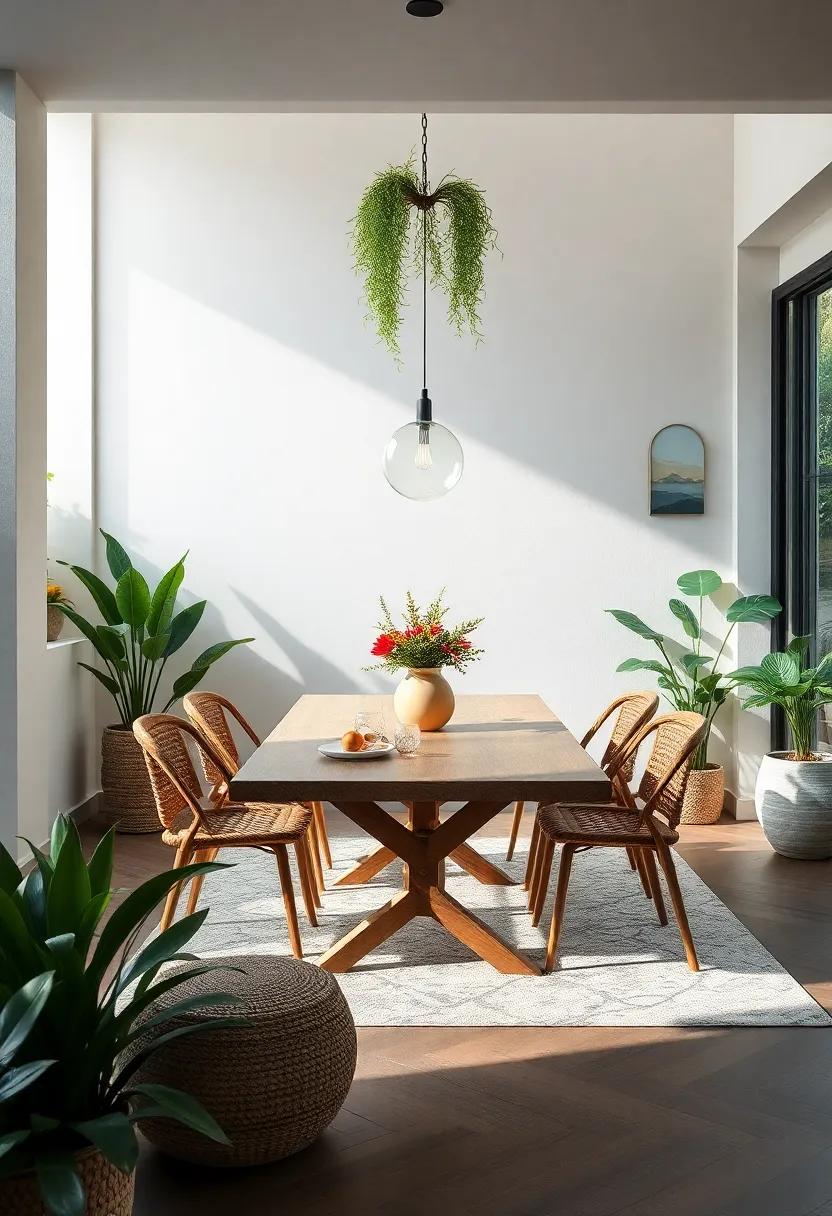
Bringing the great outdoors inside offers the perfect opportunity to explore texture through an array of nature-based materials. Consider incorporating wood, stone, and woven elements to create a cohesive look that embraces the beauty of the natural world. Each material not only adds dimensionality to your dining room but also reflects a commitment to sustainability. Imagine a centerpiece crafted from reclaimed wood, complete with rough-hewn edges, juxtaposed against the smooth curves of a ceramic vase filled with fresh wildflowers. This contrast can evoke a sense of tranquility while still making a bold design statement.
Consider a curated selection of decor items to enhance your space. Here’s a quick guide to inspire your choices:
| Material | Texture Characteristics | Suggested Uses |
|---|---|---|
| Wood | Warm, rustic, variable grains | Dining table, shelving |
| Natural Fabrics | Soft, breathable, organic | Cushions, table runners |
| Stone | Cool, solid, earthy | Coasters, tabletops |
| Wicker/Rattan | Textured, flexible, light | Chairs, centerpieces |
By thoughtfully selecting elements that play with texture, you can craft a dining experience that transcends the ordinary.Mix shapes and finishes, such as pairing a smooth, polished table with raw, unrefined chairs, to create a dialogue between different materials.Envelop your space with the essence of nature, using vibrant plant life and organic textures to curate a peaceful retreat right in the heart of your home.
Creating a Themed Dining experience Inspired by Outdoor Elements
Transform your dining room into a captivating escape by integrating natural elements that evoke the charm of the great outdoors.Start with a palette inspired by nature’s colors, such as earthy greens, soft browns, and delicate floral shades. Use table linens made from natural fibers, like linen or cotton, to maintain a casual yet inviting atmosphere. Hang lush, indoor plants around the space to create a refreshing vibe; consider pothos, ferns, and succulents, which add greenery without requiring excessive care. Layering textures, such as wooden tableware and ceramic dishes, brings warmth while enhancing the organic aesthetic of the setting.
No themed dining experience is complete without the right ambiance. Utilize ambient lighting resembling soft sunlight; think of string lights and lanterns that mimic the glow of a sunset. Incorporate subtle nature-inspired decor,including floral centerpieces with seasonal blooms or a table setting adorned with pine cones and pebbles for an organic touch. You might even consider creating a sensory experience with scented candles featuring earthy fragrances like sandalwood or fresh-cut grass. These elements will not only impress your guests but will also transport them into a serene garden retreat.
Incorporating Natural Fragrances for a refreshing Atmosphere
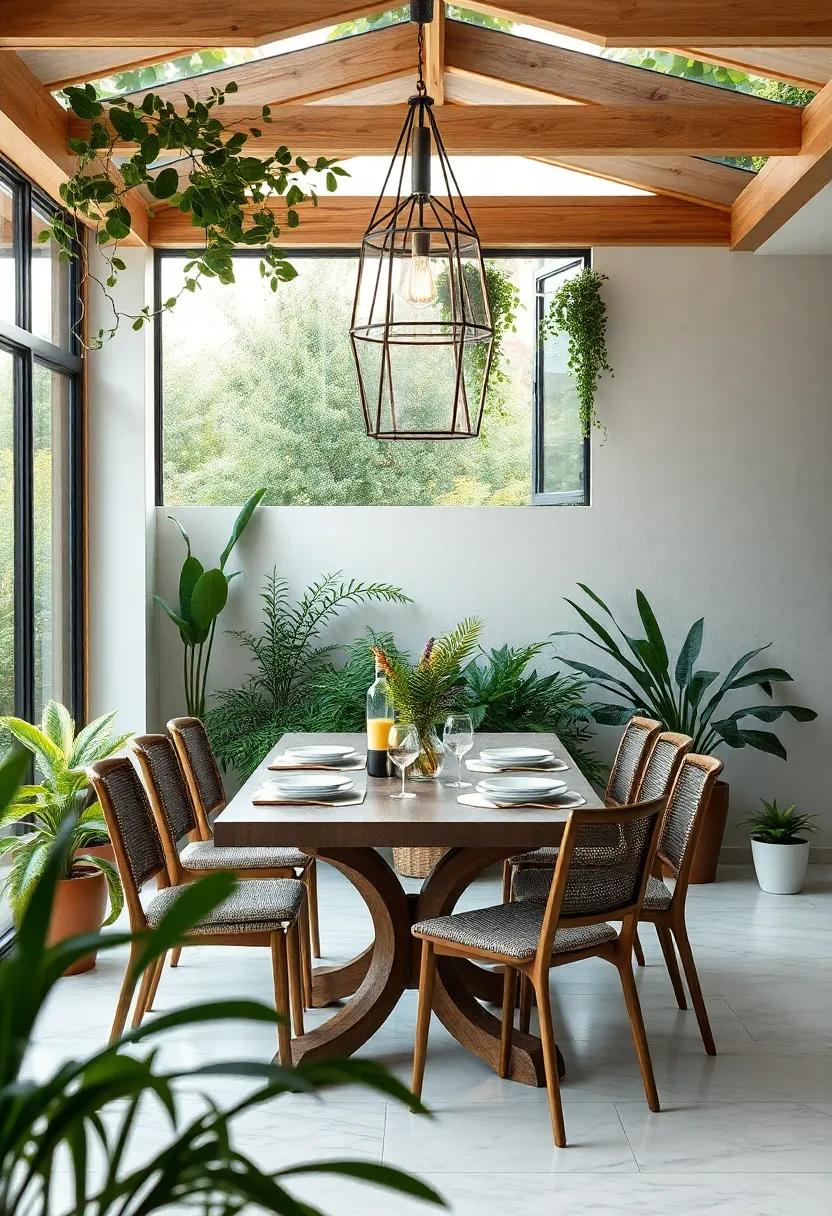
Infusing your dining room with the essence of nature can be a transformative experience that elevates not only the aesthetic but also the ambiance. To achieve a serene, garden-like atmosphere, consider incorporating natural fragrances through various mediums. Here are some popular options to explore:
- Essential Oils: Utilize diffusers filled with calming scents like lavender, eucalyptus, or citrus to create a refreshing backdrop.
- Herb Bundles: Freshly picked herbs,such as rosemary or basil,can be placed in vases to release delightful aromas while also adding a touch of greenery.
- Scented Candles: Choose soy or beeswax candles infused with organic fragrances, allowing the soft glow and pleasant scents to blend seamlessly.
- Potpourri: A mix of dried flowers, herbs, and essential oils can be elegantly displayed in bowls, providing a visual and olfactory connection to nature.
To further enhance the experience, consider incorporating a simple scent wheel that helps identify the best fragrance combinations for your space:
| Fragrance Family | Complementary Scents |
|---|---|
| Citrus | Lemon, Orange, Grapefruit |
| Herbaceous | Thyme, Basil, Mint |
| Floral | Rose, Lavender, Jasmine |
| Woody | cedar, Sandalwood, Pine |
By carefully selecting and combining these natural fragrances, you can create a dining room environment that captures the freshness of a garden retreat, making every meal an uplifting escape from the ordinary.
Designing a Flexible Layout that Encourages Indoor Outdoor Flow
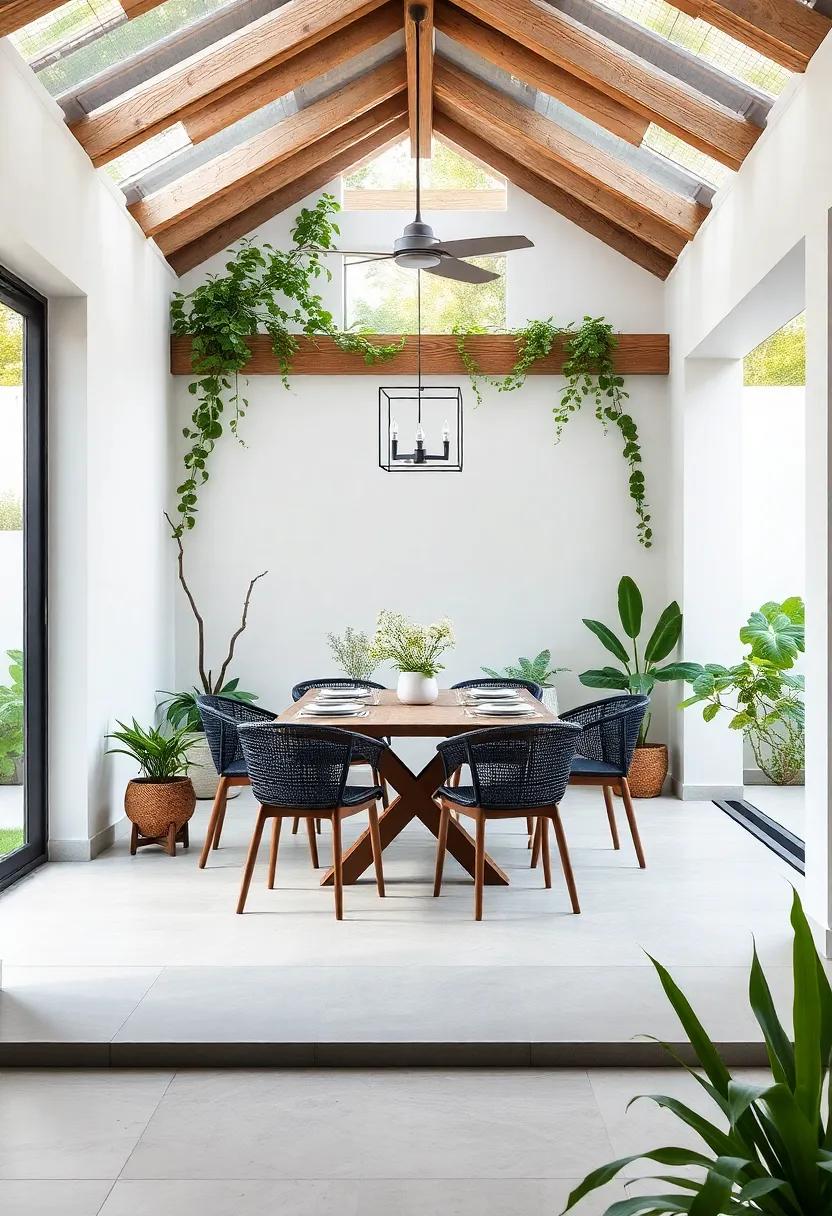
Creating a dining room that seamlessly connects with the outdoors requires thoughtful planning and design. Begin by maximizing natural light; large windows or bi-fold doors can create an inviting transition between interior spaces and the garden. Consider using materials that mirror natural surroundings—think wooden accents, stone textures, and soft fabrics that echo the softness of nature. To enhance the visual connection, incorporate plants or vertical gardens that can thrive both indoors and out, allowing the greenery to flow into your dining experience.
Incorporating flexible furniture arrangements can also play a vital role in promoting fluidity between the inside and outside. Opt for lightweight tables and chairs that can be easily rearranged or moved outdoors for alfresco dining. Add elements such as outdoor rugs or cushions that draw the eye towards the garden while making the dining space feel cohesive with nature.Here are a few essential features to consider:
- Retractable awnings for shade during sunny days
- Outdoor heaters or fire pits for cooler evenings
- Natural dividers like trellises, allowing privacy while still embracing the outdoors
Blending Indoor and Outdoor Eating Spaces for a Seamless Experience
Creating a harmonious flow between indoor and outdoor dining spaces not only enhances the aesthetic of your home but also deepens your connection with nature. To achieve this seamless experience, consider incorporating large windows, sliding glass doors, or bi-fold doors that open directly to your garden or patio.This allows for a natural light-filled ambiance while providing easy access to outdoor seating. To amplify the indoor-outdoor vibe, use similar materials and color palettes for both areas. This could include a cohesive choice of furniture styles, textiles, and decorative elements that echo the outdoor landscape.
Another effective way to blend these spaces is by introducing greenery into your dining area. Options include:
- Vertical gardens: Create a living wall with a variety of plants that thrive indoors.
- Table centerpieces: Use potted herbs or floral arrangements that bring the garden feel inside.
- Natural textures: Opt for wooden tables,wicker elements,and clay pots to mimic outdoor materials.
By thoughtfully incorporating these design elements, your dining room can transform into a serene retreat, inviting the beauty of the outdoors, irrespective of the season.
Infusing Nature with Colorful Plant Arrangements and Decorative Pots
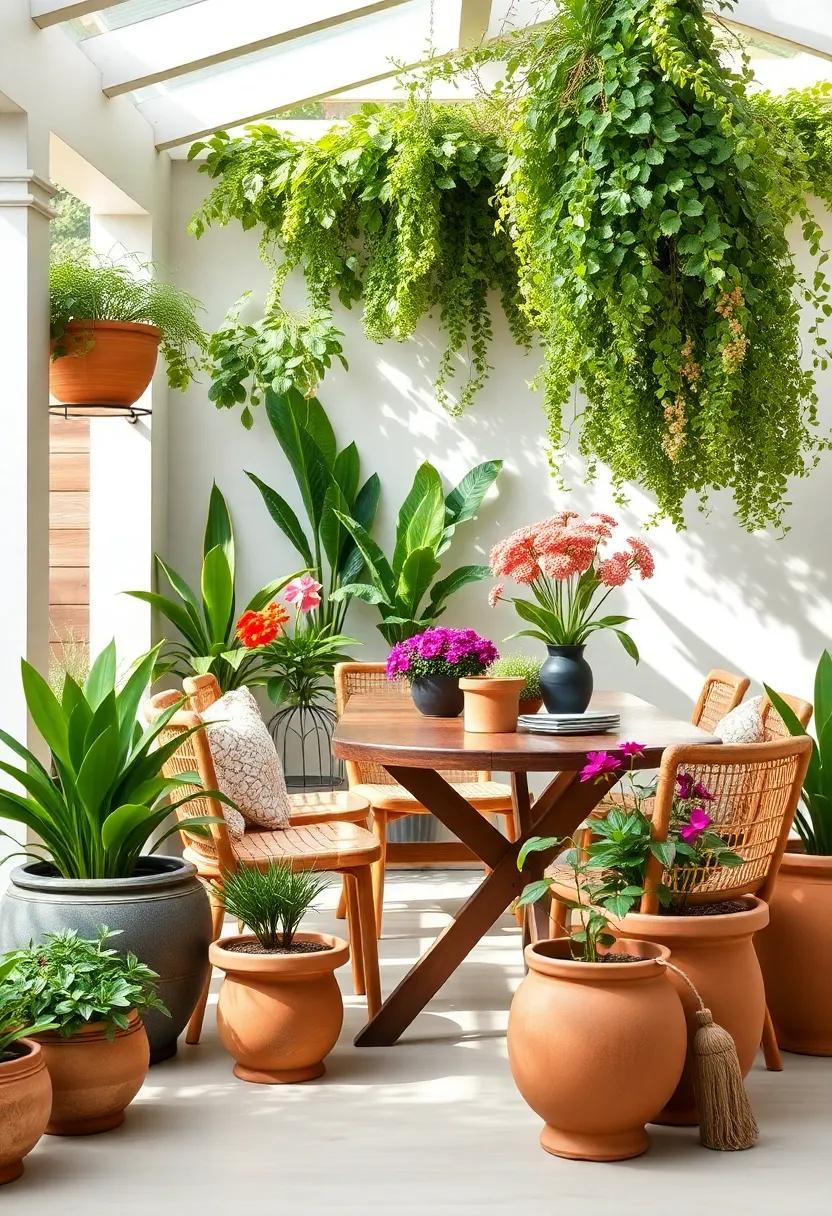
Transforming your dining room into a retreat brimming with life and color begins with the strategic use of plant arrangements. Incorporating an array of vibrant plants not only enhances the aesthetic appeal but also promotes a sense of tranquility.Consider showcasing a mix of tall floor plants, hanging greenery, and tabletop succulents to create a multi-dimensional experience. Grouping plants in various heights encourages the eye to explore the space, while vibrant blooms introduce splashes of color that can be harmonized with your existing decor.
To elevate the natural beauty of your plants, decorative pots play a pivotal role. Select pots that complement your interior style, whether it’s sleek and modern, rustic and earthy, or eclectic and colorful. Personalizing your space with detailed pots not only highlights the plant’s beauty but also reflects your individual taste. Here are some pot ideas to consider:
- Terracotta Pots - Perfect for a rustic vibe.
- Textured Stoneware - Adds depth and sophistication.
- Brightly Colored Ceramics - To introduce vibrant energy.
- Woven Baskets – For a cozy, natural touch.
If you’re looking for a more organized way to select your plant and pot combinations, consider the following table for ideal pairings:
| Plant Type | Ideal Pot Type | Style Suggestion |
|---|---|---|
| Snake Plant | Tall Ceramic | Modern Minimal |
| Pothos | Hanging Basket | Bohemian |
| Peace Lily | Textured Stone | Earthy Elegance |
| Succulents | Colorful Mini Planters | Eclectic charm |
In Summary
As we conclude our journey into the heart of a garden retreat for your dining room, it becomes clear that the embrace of nature can flourish beyond the confines of our backyards. By integrating elements of the outdoors—be it through vibrant greenery, natural textures, or the tranquil colors of the earth—your dining space can transform into a rejuvenating sanctuary.
Imagine hosting dinner parties surrounded by lush foliage, or enjoying quiet meals enveloped in a calming atmosphere that reminds you of a sun-dappled forest. This synergy between interior design and nature cultivates not only aesthetic pleasure but also emotional well-being.
So, as you embark on this creative endeavor, let your personal style blossom alongside the plants and decor you choose. Embrace the rhythms of nature in your dining room, where every meal shared and every moment savored can be a celebration of life’s simple beauty. Let’s create spaces that nurture our spirits,one leaf and one layer of texture at a time.
In this fast-paced world, taking a moment to breathe in your own little slice of nature at home can be the transformative experience you didn’t know you needed. Happy decorating!
As an Amazon Associate I earn from qualifying purchases.
